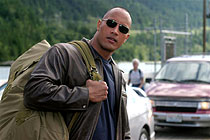|
|
|
|
Walking
Tall
|
 |
|
Sadly and ominously, we are entering what promises to be the most mindlessly violent era in the history of American cinema. From supposedly thoughtful quality dramas like Mystic River (2003) and In the Bedroom (2001) to every routine action, horror or fantasy movie, via such distasteful blockbusters as Man on Fire (2004), might is turning out to be right in a way that surpasses even the excesses of Clint Eastwood's Dirty Harry series. Back in the '70s – when the original Walking Tall (1973) was made by the talented Phil Karlson – the vigilante was a popular figure with a certain anti-establishment cachet, linked to the troubling legacy of America's involvement in Vietnam and often set against a spineless, corrupt, Watergate-tainted government. Today, in the shadow of the "war against terror", the Coalition of the Willing and the invasion of Iraq, all this has become blurred. The vigilante as hero and the leader as new Messiah are becoming indistinguishable, combined forces in the struggle against an amorphously defined menace. And those few, choice ambiguities which partly redeemed the Dirty Harry films (was the avenging hero psychotic, traumatised, obsessed?) have now all but disappeared. For decades now, many critics and cultural commentators have routinely worked on the assumption that mass culture somehow, naturally, mirrors – in however distorted a fashion – the popular imagination, picking up the vibe of what the majority of citizens are dreaming or worrying about. The truth of this somewhat mystical "reflection" business is both simpler and more complex than that. Films are not born from collective-unconscious emanations. They are calculated guesses, on the part of producers canny or otherwise, about what is going to score with an audience – what that audience dimly or directly wants to experience, and also what it can be cajoled into experiencing. That is a very elastic – and sometimes ideologically insidious – situation, in which the hunches of producers may manage (or not) to push consumers' thoughts and emotions in any number of potential directions. It's not an ideological conspiracy run by the ruling class, but it is a volatile and frequently rigged arena for the struggle of competing views and tendencies both within individuals and audience collectivities. Viewers can be persuaded to dream through or with a film – a process which critics often mistakenly give a naturally progressive or subversive orientation – but they can just as easily and powerfully be persuaded to vent, to channel and focus very bad vibes, to flee the implications of an issue by trivialising it into a gag, and so on. Pop culture can just as thoroughly bring out the worst thought and response mechanisms in a social community as it can nourish the best and most radical potentialities. Back to the case at hand. The new version of Walking Tall, designed as a vehicle for Dwayne 'The Rock' Johnson, is an early contender for the least intelligent film in this current cycle. As a movie which amuses rather than upsets, it is essentially harmless. But churning around in it are some disturbing signs of the tidal wave of pop culture fantasies to come. Walking Tall is a strange, violent fairy tale – but a fairy tale nonetheless. Chris (The Rock) is back home after a soldier's career that is left vague but is no doubt glorious. He does not like what he finds, especially as embodied in the old friend turned savage, blonde-haired entrepreneur, Jay (Neal McDonough). Chris takes a stand with a large and powerful piece of cedar wood, as opposed to the nasty guns wielded by the villains. Ordinary folk use whatever they can! The entire story rests on a nostalgic dream, comparing the bad era of ruthless, corporate capitalism introduced by the local casino with the good old days of an industrial mill that once employed all the town's inhabitants. The film's furious wish to turn back the clock on this dubious march of progress is almost touching in its na´vetÚ. Equally misplaced is the script's attempt to ameliorate Chris' vengeful motivation with a little drugs-among-teens panic. Perhaps the oddest aspect of this lean little film (artificially extended by around ten minutes of closing credits to clock in at Hollywood-approved feature length) is the almost total absence of anything resembling a surrounding body of citizens. Beyond the risible scene in which our hero's shows off his hideous scars to an applauding audience of citizens in the courtroom, Chris's brutal campaign to clean up the town occurs in an almost total social vacuum. There is only a trio of goodies – although his pal Ray (Johnny Knoxville) and girlfriend Deni (Ashley Scott) hardly figure in the action beyond providing (respectively) sidebar laughs and a sex frisson – plus a bunch of baddies and a few expendable architectural structures. It is disconcerting to notice the names of gifted screenwriters like David Klass (Desperate Measures [1998], Kiss the Girls [1997]) and the team of David Levien and Brian Koppelman (Knockaround Guys, 2002) in the credits. Whatever novel or subversive flourishes they may have wished to contribute to this project have been mulched under by Kevin Bray's unimaginative, streamlined direction – and by the straight-down-the-line vision for wrath-filled entertainment in contemporary America. © Adrian Martin August 2004 |
![]()